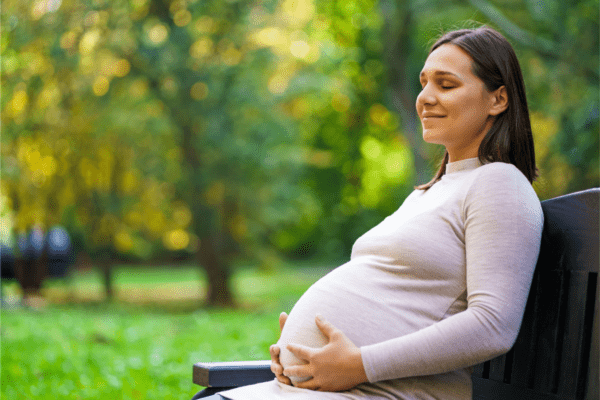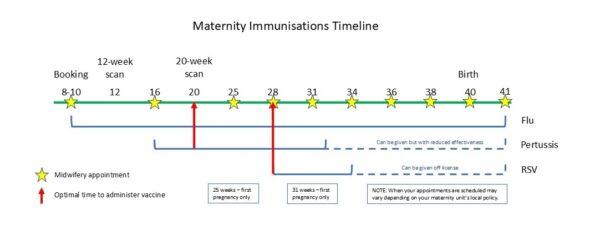Why are vaccines important?
Some vaccines are recommended during pregnancy to protect the health of you and your baby.
During pregnancy, your immune system (the body’s natural defence) is weakened to protect the pregnancy. This can mean you’re less able to fight off infections which is why you will be offered the flu vaccine while you are pregnant. Other vaccines, such as the whooping cough (pertussis) vaccine, are recommend during pregnancy to ensure your baby is protected up until they have their own vaccination at 8 weeks old.
All of the vaccinations that are recommended during pregnancy have been shown through research to help keep you and baby safe. They are inactive, which means they do not contain a live version of the viruses they are protecting against.
The decision to get vaccinated during pregnancy is yours and it’s natural to have questions or concerns about whether it’s right for you. Find out more below.
What vaccinations can I get?
The whooping cough (pertussis), respiratory syncytial virus (RSV) and flu vaccines are recommended during pregnancy to protect the health of you and your baby. These vaccines do not contain any live viruses so cannot give you or your baby the virus it is protecting against.
The vaccination in pregnancy (ViP) programmes
Information about each vaccine
If you have concerns or questions about any of the vaccinations offered during pregnancy, speak to your GP or midwife. You can also visit the NHS website for information about vaccinations while you are pregnant.
RSV vaccination
Respiratory syncytial virus (RSV) is a common respiratory virus that that can cause serious lung infections in babies.
When you have the RSV vaccination in pregnancy, your body produces antibodies to protect against it. These antibodies pass to your baby giving them very good protection from birth.
All women who are at least 28 weeks pregnant on 1 September 2024 will be offered the vaccine and then it will be routinely offered to all pregnant women at 28 weeks.
What are the possible side effects of the RSV vaccination during pregnancy?
The most common side effects of the RSV vaccine during pregnancy are mild and go away within two days and may include: pain at the injection site, tiredness, muscle pain, headache, and nausea
Flu vaccination
Pregnant women are more likely to get serious complications and be admitted to hospital if they catch flu, putting them and their baby at risk. Having the flu vaccine while pregnant means you are significantly less likely to catch flu.
The flu strains the vaccine protects against are updated each year so the best time to have it is in autumn when the latest vaccine is available but before flu starts circulating. You can still get a vaccine at any time of the flu season and at any stage of pregnancy.
What symptoms do you get after flu jab when pregnant?
Injected flu vaccines do not contain any live viruses so cannot cause flu. Some people get a slightly raised temperature and aching muscles for a couple of days afterwards, and you may feel sore at the injection site.
Whooping cough (pertussis) vaccination
Whooping cough – also known as pertussis – is a very serious infection of the lungs, and young babies are most at risk. Most babies with whooping cough will be admitted to hospital. When you have the whooping cough vaccine in pregnancy, your body produces antibodies to protect against whooping cough. These antibodies pass to your baby giving them very good protection from birth until they’re able to have their whooping cough vaccination at 8 weeks old. The vaccine is usually given when you are 16 to 32 weeks pregnant. If for any reason you miss having the vaccine, you can still have it up until you go into labour.
What are the possible side effects of the whooping cough vaccine whilst pregnant?
It’s much safer for you to have the vaccination than to risk your newborn baby catching whooping cough. You may have some mild side effects from the vaccination such as swelling, redness or tenderness where the vaccine was given. Serious side effects are extremely rare.
Pastor Nick Chanda speaks with Dr. Oge Ilozue about the increasing cases of pertussis infection, also known as whooping cough, to raise awareness and offer advice for pregnant women on getting vaccinated.
Travel vaccines in pregnancy
When you’re pregnant, it’s best to avoid visiting countries or areas where travel vaccinations are required.
It may not always be possible to avoid areas that require vaccinations when you’re pregnant. If this is the case, talk to a midwife or GP, who can tell you about the risks and benefits of any vaccinations you might need.
If there’s a high risk of infection in the area you are travelling to, it’s often safer to have a vaccine rather than travel unprotected as most diseases will be more harmful to your baby than a vaccine.
For example, yellow fever is a virus spread by mosquitoes. Most people who get severe yellow fever die from it. The yellow fever vaccine is a live vaccine, but it may be considered necessary to have the vaccination if you’re travelling to areas where yellow fever is common because the risks of yellow fever are so high.
Pregnancy and malaria
Pregnant women are particularly susceptible to malaria. This is a serious condition which, if severe, can be fatal for both a mother and her baby. Malaria mainly affects countries in:
- Africa
- South America and Central America
- Asia
- the Middle East
If possible, avoid travelling in these areas if you are pregnant. However, if you’re unable to postpone or cancel your trip, preventative treatment is available. This involves taking antimalarial medicine tablets to reduce your risk of getting malaria.
The antimalarial medicine you take may depend on which country you’re travelling to, your stage of pregnancy and whether you have any other pre-existing medical conditions. In some areas certain antimalarial medicines do not work because the malaria parasite has developed resistance to them.
Some antimalarial medicines are known to affect the developing baby. For example, doxycycline can cause the baby’s milk teeth to be discoloured if a pregnant woman takes it after the first 12 or 13 weeks of pregnancy.
Other antimalarial medicines have not been studied sufficiently and more research on their use in pregnancy is needed. But the risk of harm to you and your baby from malaria is likely to be much greater than any potential risk from taking antimalarial medicine.
Protecting yourself against malaria
If you’re pregnant, make sure you take precautions against being bitten by insects. For example:
- use a mosquito repellent that’s specifically recommended for use in pregnancy
- wear a long-sleeved top, full-length trousers and socks to cover up your skin from dusk until dawn
- always sleep under a mosquito net
Advice regarding rashes during pregnancy
Rash illness at any stage of pregnancy should be investigated and you should contact your midwife or GP for advice.
If you are pregnant and have been near or come into contact with someone with any of the below infections, you should contact your midwife or GP immediately:
- Slapped cheek syndrome caused by Parvovirus B19 (also known as fifth disease)
- Measles
- Rubella
- Chickenpox
Measles and rubella are infections that can lead to complications during pregnancy. There is currently a risk of catching measles for those that have not had the two doses of MMR (measles, mumps and rubella) vaccine. This is due to measles cases increasing across London.
You can reduce your risk by:
- Getting all your eligible children vaccinated (measles spreads easily among young children)
- Contacting your midwife or GP if you are pregnant and have come into contact with someone with measles
- Getting the measles vaccine if you are planning to get pregnant (you cannot have the vaccine whilst pregnant)
- Practising good hand and respirator hygiene:
- Wash your hands often with water and soap
- Use tissues to trap germs when you cough or sneeze
- Bin used tissues as quickly as possible
Related Links and useful resources
Keeping well in pregnancy website links:
- Have a healthy diet in pregnancy
- Vegetarian or vegan and pregnant
- Foods to avoid in pregnancy
- Vitamins, supplements and nutrition in pregnancy
- Exercise in pregnancy
- Medicines in pregnancy
- Mental health in pregnancy
- Depression in pregnancy
- Sex in pregnancy
- Travelling in pregnancy
- Work and pregnancy
- Your baby’s movements
- Reducing the risk of stillbirth
- Drinking alcohol while pregnant
- Stop smoking in pregnancy
- Illegal drugs in pregnancy
- Vaccinations in pregnancy – NHS
- The flu jab in pregnancy
- Whooping cough vaccination in pregnancy
- Infections in pregnancy that may affect your baby
- Pregnancy and COVID-19
Let’s talk about vaccines during pregnancy – You Tube video full length
Let’s talk about vaccines during pregnancy – You Tube video short version 1
Let’s talk about vaccines during pregnancy – You Tube video short version 2
Downloads
- NCL Vaccination in pregnancy leaflet
- UKHSA Pregnant? Immunisation helps to protect you and your baby from infectious diseases
- Pertussis resources: immunisation collection – Whooping cough and pregnancy booklet; Help protect your baby with the whooping cough vaccine
- Health Publications website vaccination in pregnancy – Search Publications – Health Publications
The Romanian and Eastern European Hub – vaccination webinar – YouTube
Acknowledgement: Thanks to NEL Health & Care Partnership for allowing us to share their content in the development of this webpage


